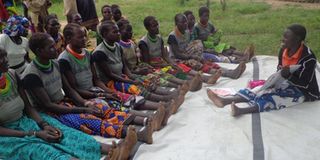Coping with menstrual hygiene amid water scarcity

Lead mothers in Nakapiripirit District take their lessons. Photo by Beatrice Nakibuuka.
When a woman gets into her menstrual cycle, this is the time she must be clean and bathe as often as possible. Every girl and woman deserves the right to manage her menstruation in a hygienic way to help her reach her full potential. However, maintaining menstrual hygiene is still a nightmare for some women who live in water-scarce areas such as Karamoja.
“Traditionally, when a girl starts to menstruate, she collects sand which she puts in one corner of the hut and sits on the sand until the end of her bleeding days. Their esteem is very low during these days and they are not allowed to do much work because they are thought to be dirty,” says Judith Ayamo, a mother of three.
She also remarks that one has to move for a long distance to find water which they must use sparingly because other family members will also need some of it. Despite the free primary and secondary education in the area, most school going adolescents stay home during their menstruation periods because they do not have pads and fear their uniforms being stained while they are at school because others will laugh at them. When they are at home and their clothes get stained, they just turn the skirt and make a simple wipe but do not wash because not many of them know that it is important to wash during this time.
Real life experience
Anna Tukei, 32, a mother of four and a lead mother at Longaroi village in Nakapiripiriti explains the experience of scarcity of water during menstruation periods.
“It is very discomforting to move with the dirt of the menstrual blood but in a place like this where you have to walk for three kilometres to find a water source; it is hard to maintain menstrual hygiene. We can only fetch one jerry can at a time because we have no collecting tins and we use very little of the water at a time as other family members need the water too.
As a lead mother, I must be an example to the people I teach about good hygiene. I must look for water to bathe even if it means going three kilometres to reach the borehole. We have been learning that maintaining menstrual hygiene is a good practice.
Initially, I used to just turn my shirt to another side and make a simple wipe whenever I got a blood stain then would continue with my other work of taking care of my family. No one wanted to come close to me because of the stench I had. I had only one pad that I changed at night but now, I change my pads thrice. I use pads that I buy from the hospital at Shs2,000 but they are very expensive.
Not many women use pads because of the price. I manage to buy them once in a while when I have sold something.
I use the pads on the first and second day of my cycle when the flow is too heavy then use my old knickers for the remaining days when the flow has subsided. I bury the pads after use but I make sure I wash and dry the knickers so that I can use them for the next cycle.
Parents and husbands never buy pads for their daughters and wives because they think they are luxuries. The men are not supportive at all and only intervene if a woman had a miscarriage. This is the only time they can buy the pads.
We have been empowered by the organisations like MAP Uganda and Concern Worldwide which have helped us to know that good hygiene is healthy and reduced our rate of falling sick and we are carrying on this information to the women in our community so that we can lead better healthy lives.”




